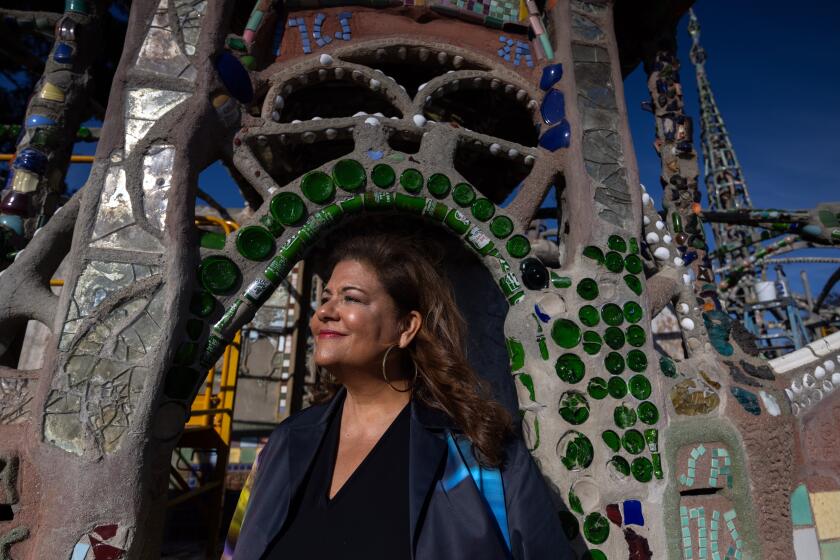‘Where are you really from?’ A Latine landmark disrupts Pasadena Playhouse’s 100-year history
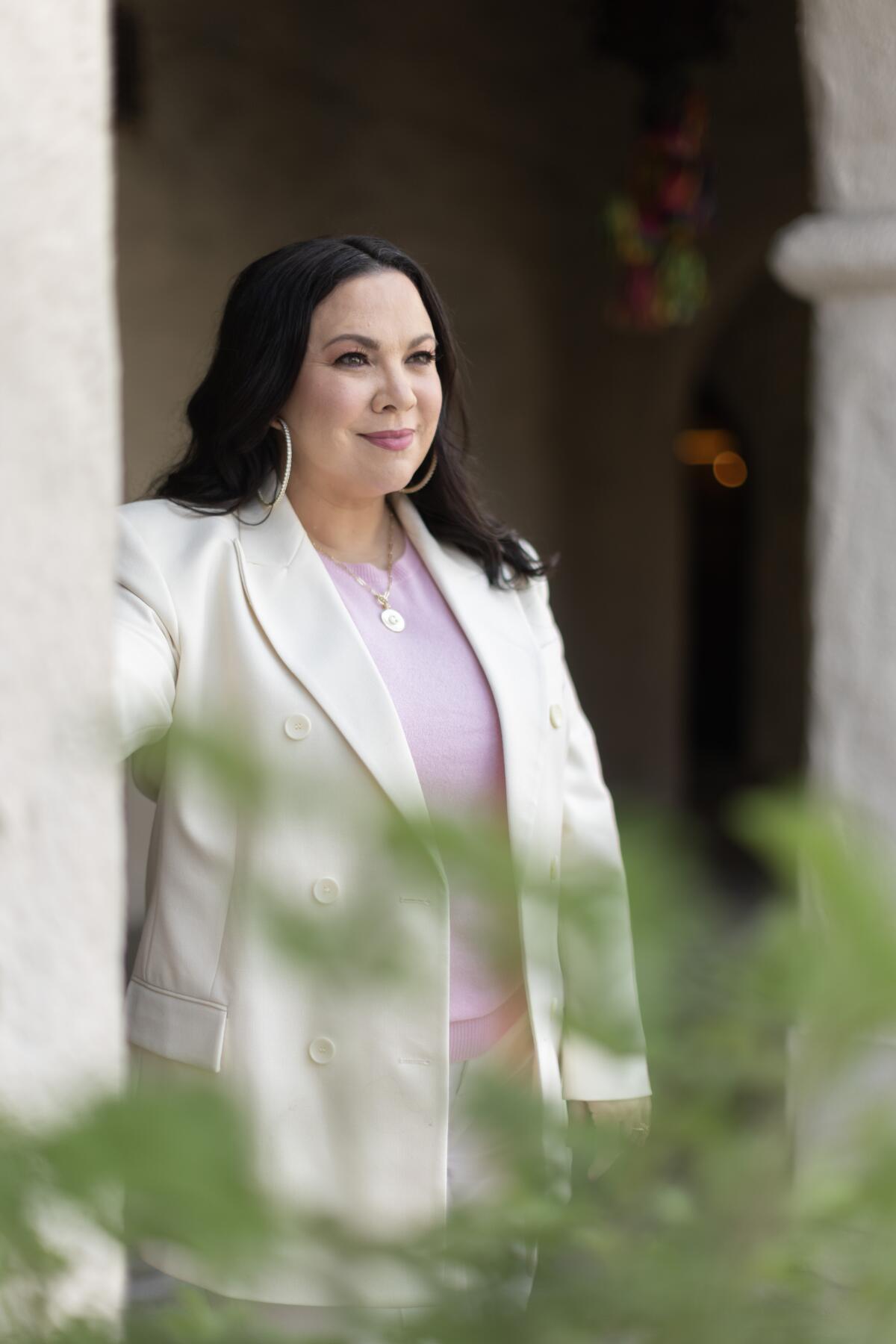
The pillows are fluffed, the cocktails are mixed, the enchiladas are warming in the oven. Ilana and Enrique Gomez have done everything to ready their Pasadena mansion for the arrival of their daughter’s boyfriend. But nothing could prepare them for who the person at their front door turns out to be.
In Gloria Calderón Kellett’s new play “One of the Good Ones,” this scenario leads to frank conversation, unfolding in real time, about unconscious biases, intergenerational expectations and who gets to claim Latino and American identity. (Between spit takes, hot flashes and swings at a very full piñata, that is.)
“It’s ‘Guess Who’s Coming to Dinner’ meets ‘Disgraced,’” teased director Kimberly Senior. “And even though it’s a one-act play, the second act is the conversation you’ll probably be having afterward.”
While the play’s title reflects how the onstage parents (Lana Parrilla and Carlos Gómez) view their only daughter (Isabella Gomez), it also echoes how Calderón Kellett, one of the industry’s few Latina showrunners (“One Day at a Time,” “With Love”), says she’s been received during her Hollywood career: with “zoo animal fascination with what it’s like to be a nonwhite man telling stories.” And the world-premiere comedy, running through April 7, is the first Latine commission in the 100-year history of the Tony-winning Pasadena Playhouse — a landmark worth celebrating, though sorely overdue for a Los Angeles theater company.
Ahead of the play’s opening night on Sunday, Calderón Kellett had a candid chat with The Times about writing Latino characters who are thriving, learning about theater from Norman Lear and making even the toughest conversations laugh-out-loud funny.
How did “One of the Good Ones” come to be?
I wanted to write something about the complexities of identity. Before the strike, I spoke to Danny [Feldman, artistic director of the Pasadena Playhouse] about the fact that, though I’ve been a [television] writer for 15 years on many shows, when I did “One Day at a Time,” all people were interested in talking about was my Latinidad. I’m happy to talk about it, because I love who I am and I’m proud of my parents and where they came from, but it’s all people wanted to talk about. And I would get it from both sides, from the white perspective and from the Latino perspective — this sort of zoo animal fascination with what it’s like to be a non-white-man telling stories.
So I had to navigate being a storyteller and constantly defending your point of view in the world, which I found bizarre because it’s not something my white counterparts ever have to do. [“One Day at a Time” co-showrunner] Mike Royce was like, “Man, I just get to show up and tell stories and jokes, you have to come in with the weight of the world on your shoulders to represent your community. It’s so much heavier, what you have to do, and I see you.” I burst into tears and he hugged me.
Thanks to Elizabeth Alexander, the Mellon has committed $500 million to preserve, relocate and generate discussion about monuments — and it’s changing the nature of monuments.
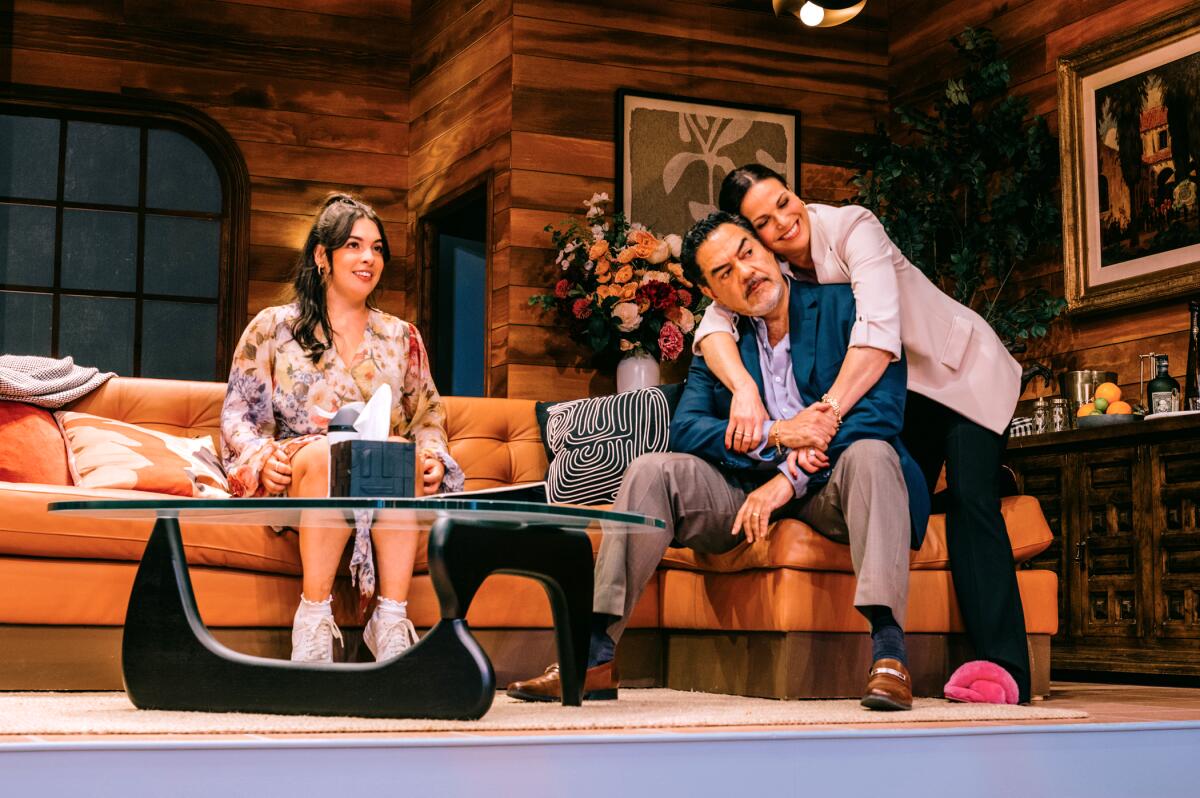
The play discusses identity — Latino and American — from multiple perspectives within one family: One parent is of Puerto Rican and Mexican descent, another is Cuban with grandparents from Spain. What inspired these characters and their conversation?
Having to navigate those spaces myself. I’m a West Coast Cuban who grew up in Portland, Ore., and then San Diego. And then in Los Angeles, I was constantly being told as an actress in auditions that I’m not Latina enough, I’m not dark enough, I need more of an accent to play this Latina character. I’m literally 100% Latina! So is identity based on where you live, where your parents lived, what language you speak, what you think it’s supposed to look like?
I also wanted it to be an intergenerational conversation. Writing “One Day at a Time,” I had so many talks with my viejitos about LGBTQIA issues and using Latino/Latina/Latinx — all of that stuff, they don’t know anything about it, they think it’s all crazy. But I loved talking to them about these things, everyone asking questions and trying to understand each other. So though everyone [onstage] is both right and wrong, and though they might not get any definitive answers by the end of the conversation, that they’re able to talk about it, chip away at it and maybe, over time, they’ll get it — that’s the answer.
This discussion unfolds in real time, and though it does get heavy at times, it’s also hilarious. How did you find the funny in such complex topics?
The idea of who gets to claim an identity, that fine line between cultural appropriation and cultural appreciation, it’s so interesting! And one thing I wanted to do: There are lines in here that white people constantly say to Latino people in real life. Like, “Where are you really from?” “Some of our best friends are Latino!” We get that stuff all the time. So I purposefully wanted to see that in the mouths of the Latino characters, let this conversation unfold and have the audience be a fly on the wall in this home.
And with all storytelling, specificity is universal. Like, there wouldn’t have been anybody who walked through that front door who would’ve been good enough for their daughter, and that’s something every parent can relate to. So if you’re not Latino, there’s still going to be things in here that resonate with you. I hope the audience laughs a lot, and then talks for hours afterward. For me, that’d be the biggest win.
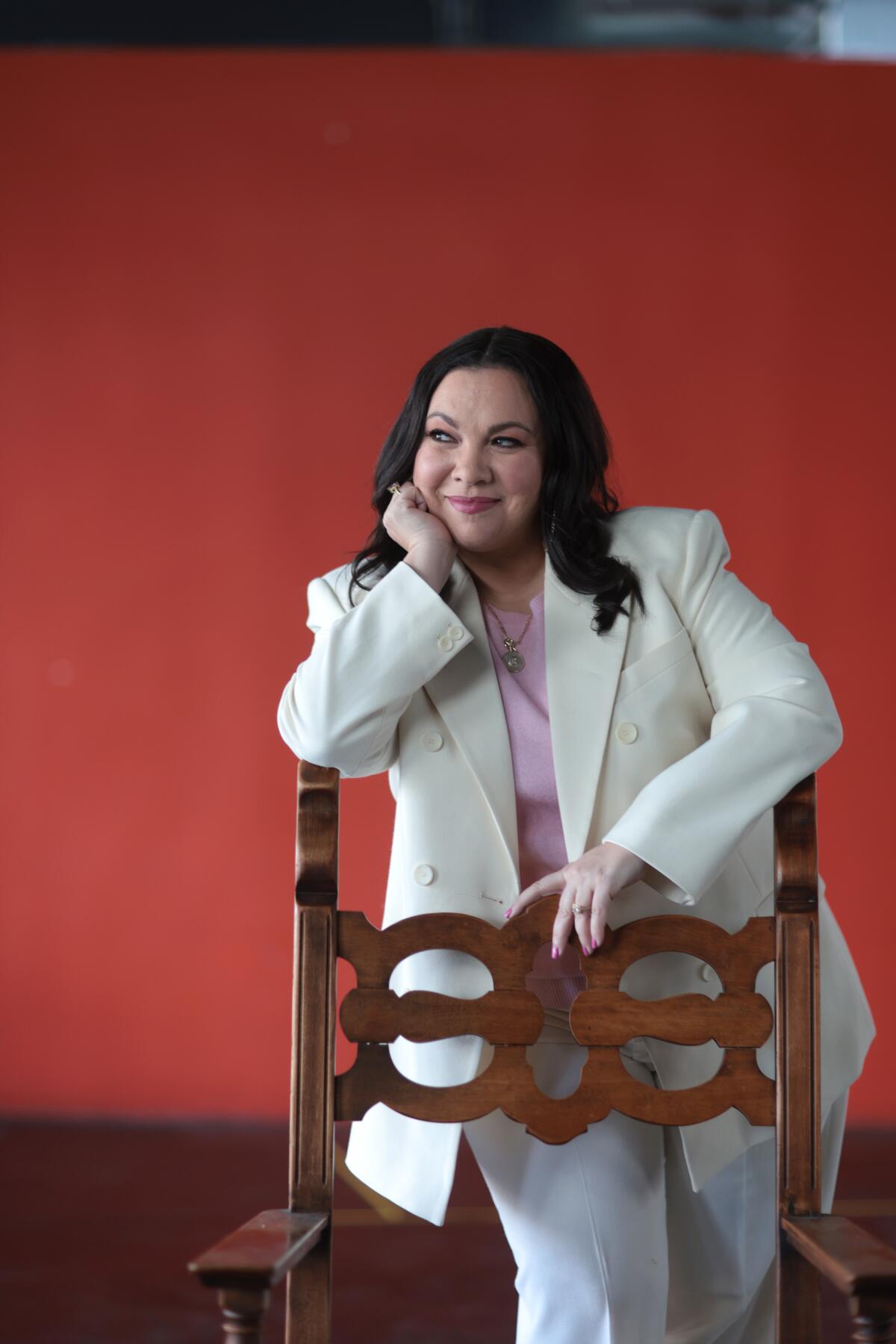
It’s a bittersweet milestone that your play is the first Latine commission in Pasadena Playhouse’s 100-year history. So I do love that you highlight the city’s Indigenous roots in the script when matriarch Ilana says, “I was born in Mexico. It’s just not called that anymore.”
The idea of America as the “great experiment” is so interesting, and who feels entitled to this land is fascinating, because it’s not theirs either. And I just had to challenge the idea that anyone feels entitled to this place more than anyone else, with the exception of the native people who actually are from this land.
This is actually the first play I’ve written that is specifically Latino. All the plays I’ve written before were an answer to what I wasn’t finding when I was auditioning as an actor; they were mostly for myself and my friends, just existing as humans in spaces. And those plays worked well for me because they got me staffed on TV shows.
Do you feel pressure debuting your first Latino play in Los Angeles?
I know that one story can’t speak to all experiences; this is this specific family in this specific time on this specific land.
I am really proud of the fact that this play exists. Our stories are only really invested in when we are in trauma or when we are glorified drug dealers, and then that’s how people who do not know people from my community think we are, because they don’t know themselves. Latinos are 20% of the United States population, and still only 5% [of actors in leading roles], and I can’t even imagine what the numbers are for theater. I’m curious about how many Latino productions are being done, and of those productions, how many are border stories or drug narratives, and how many are just Latino people living their lives and being happy.
And the other thing is, we’re always poor — and that 100% exists, but I also know a lot of Latinos who are thriving. So it’s very important for me to show that on this land, there are Latinos living in big houses, who send their kids to college, who have thriving businesses. And yet they still walk with a lot of these issues about identity and connection on their shoulders.
How do you adapt ‘Don Quixote’? According to playwright Octavio Solis, by drawing inspiration from El Paso
Octavio Solis had taken on an impossible task. Could he, the mighty Mexican American playwright from El Paso, adapt Miguel de Cervantes’ ‘Don Quixote’?
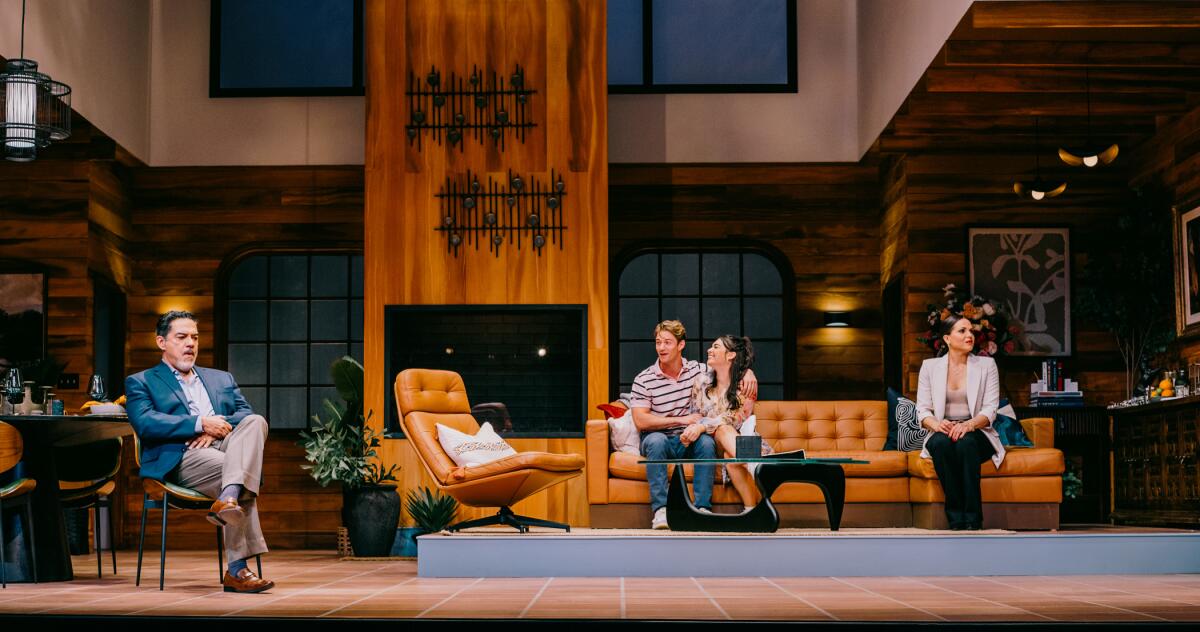
How have your years writing for television benefited your playwriting?
I learned so much from working with Norman Lear. Norman loved the theater, and because he wanted to bring the theater to the everyday family in their households, his multicam sitcoms were very different: the proscenium, long scenes, pages and pages with no jokes. Because it wasn’t always about the jokes, it was about the conversation. You’re there to tell a story; sometimes it’s funny, sometimes it’s not. People processing their feelings might mean acting out or silence or awkwardness; it might be scary and then funny again. Real life is all of those things. That was the type of sitcom he liked, and that’s the type of sitcom I like.
For this play, I get to sit with that at length — no scenes, one location, all in real time. It’s building the tension with the audience live and not letting them off the hook until the end.
What’s been the hardest part about writing this play?
The biggest challenge for me is the fact that there’s so much I want to say. I feel like it could be four hours long! I’m telling myself, “You don’t have to get all of it in this one play. You don’t have to fix all of it. Just tell this one story.”
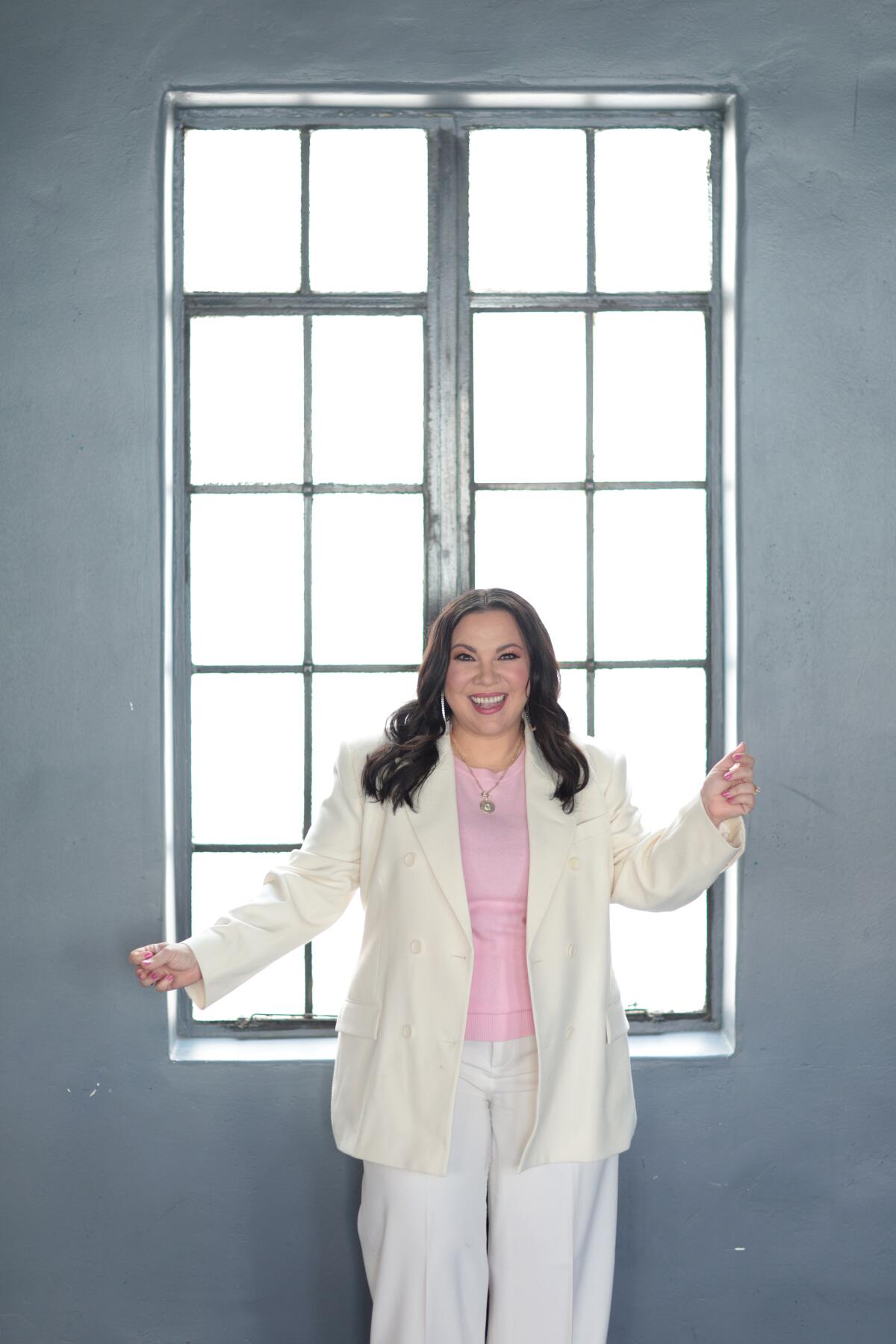
What is your hope for “One of the Good Ones” after this run ends?
Whether it’s a pilot or a play, I always love putting up new work, and this has been a wonderful opportunity to stretch my creative muscles. I would love to keep developing it at other theaters, and I’m hopeful that it will lead to audiences’ conversations, healing and understanding of one another.
I also think a lot about who gets to hold a microphone and tell a story. I’m trying to do it in a way that is inclusive and responsible for what I want the future to look like. So I hope this show is successful and will lead to many more stories where the focus is on the thriving, not the trauma. And I hope they come from many different points of view, because I get called a “unicorn” a lot, like I’m the only one, right? No, I promise, I’m not. There’s more of us, and we’ve got work to do.
'One of the Good Ones'
Where: Pasadena Playhouse, 39 S. El Molino Ave., Pasadena
When: 8 p.m. Wednesdays-Fridays, 2 and 8 p.m. Saturdays, 2 p.m. Sundays. Ends April 7.
Tickets: Start at $35
Contact: (626) 356-7529 or pasadenaplayhouse.org
Running time: 1 hour, 30 minutes
More to Read
The biggest entertainment stories
Get our big stories about Hollywood, film, television, music, arts, culture and more right in your inbox as soon as they publish.
You may occasionally receive promotional content from the Los Angeles Times.
